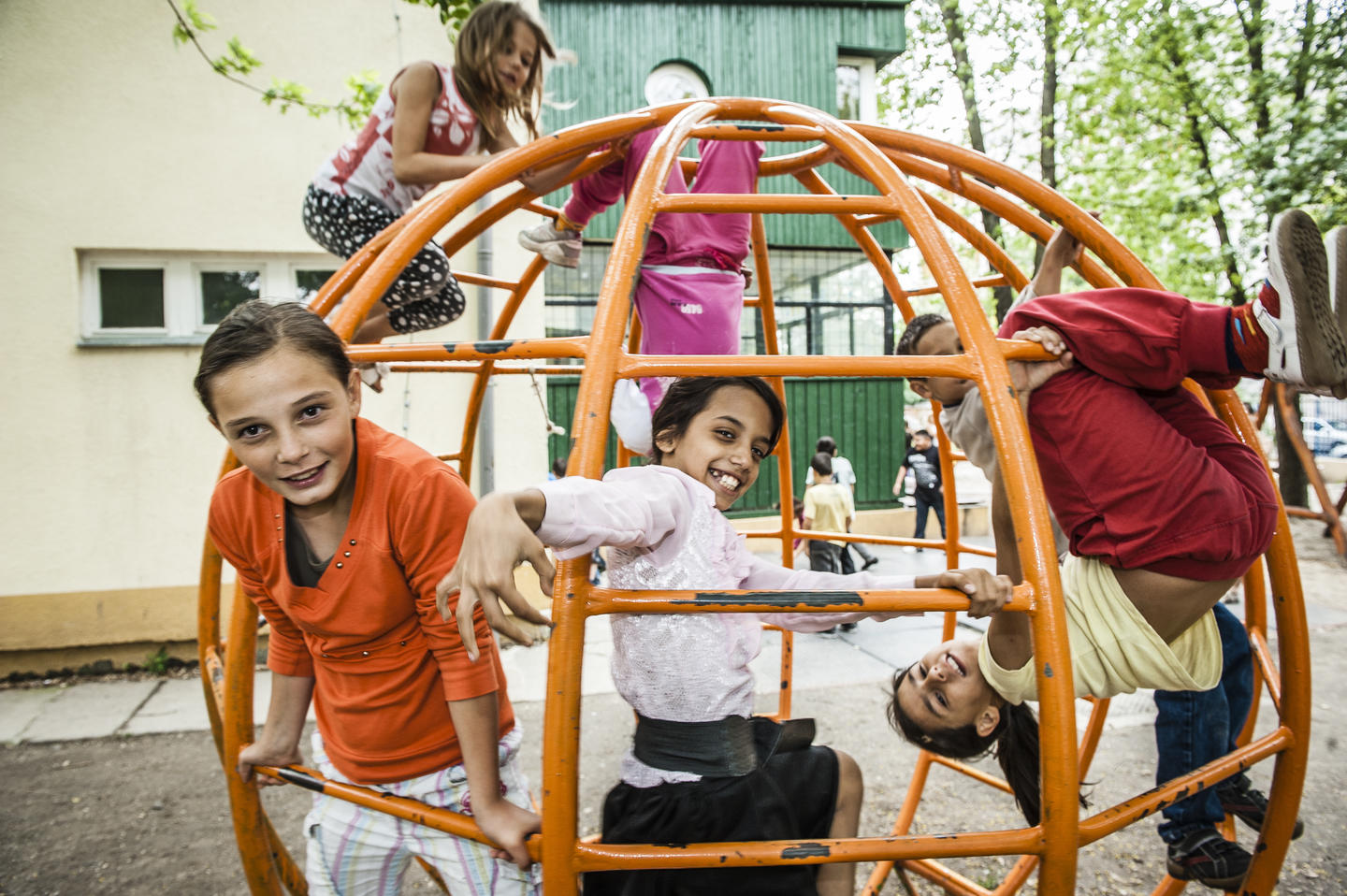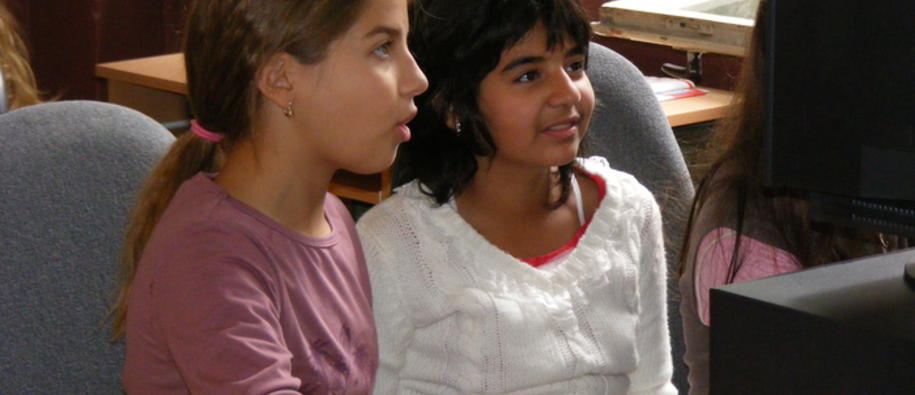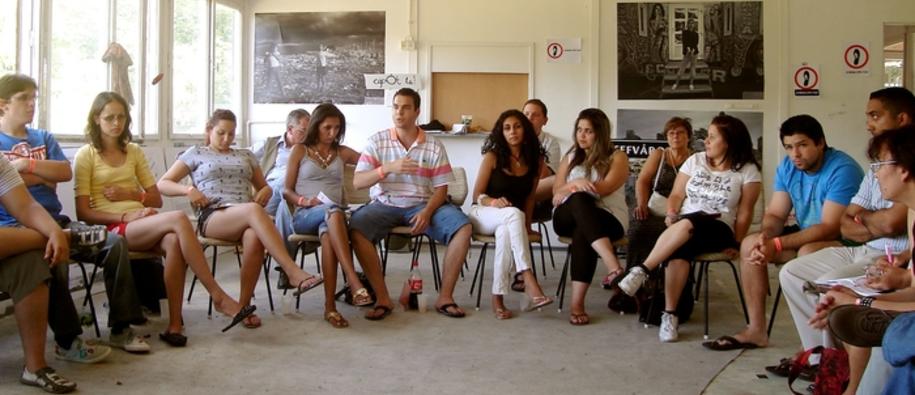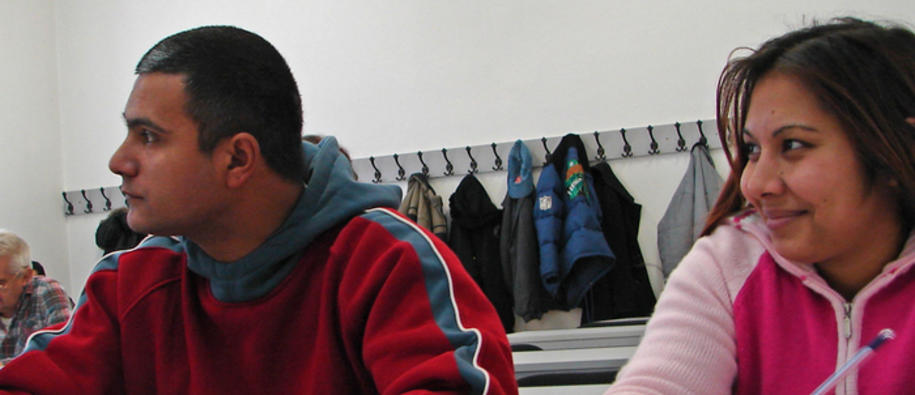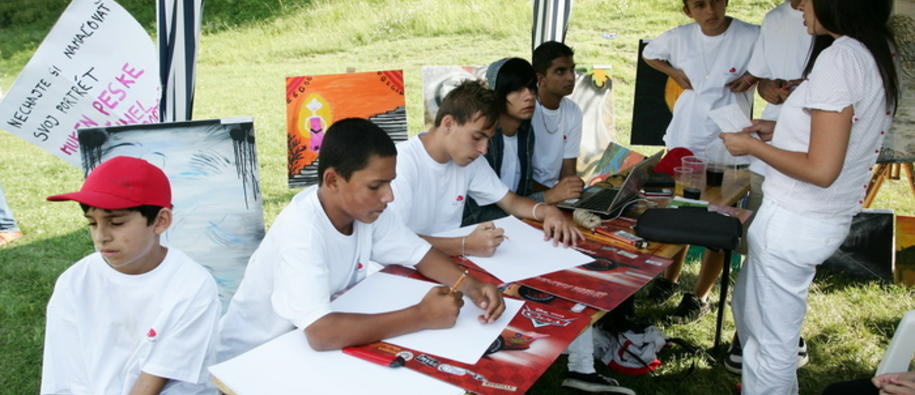A large proportion of the Roma population in Europe face deep social and economic exclusion. Widespread discrimination and segregation often exclude Roma from full participation in society, locking them into a cycle of poverty and marginalisation.
Education and employment are crucial areas for Roma integration. Employment rates among Roma in Central Europe are much lower than for the rest of the population, often due to discrimination in the labour market. Many working-age Roma also lack the education needed to find good jobs. Providing Roma children with access to education is an important measure to break vicious circles of intergenerational deep poverty.
In Hungary and Slovakia, both countries with significant Roma minorities, €6 million in EEA and Norway Grants were used to advance Roma education and labour market integration. (See the end of the article for an overview of these projects.)
In Slovakia, a social integration project involved 1000 Roma children in 40 primary schools. In neighbouring Hungary, newly educated Roma in Budapest were provided work placements in municipal institutions, which secured their transition from education to the labour market.
200 NGO projects used support from the Grants to empower vulnerable groups, of which 12 projects targeted the Roma population in particular. These projects, which were carried out in the Czech Republic, Hungary, Romania, Slovakia and Slovenia, ranged from mapping Roma’s access to health care services, setting up a centre for Roma journalism to initiatives to improve relations between young Roma and the majority population.
Many Roma also benefited from other projects targeting disadvantaged groups within health and social services. It is often difficult to measure the extent to which the Roma population has benefited from financed projects. Many public institutions, such as hospitals and municipal services, do not register ethnicity among their users and several Roma do not have a birth certificate.
OVERVIEW of Roma-related projects in the funding period 2004-09
READ ALSO: The funding to Roma related projects have been stepped up in the period 2009-2014
CASES
Promoting integration through education in Slovakia
Slovakia is home to about 350,000 Roma. The country has the third highest percentage of Roma residents in the EU (1.7%), behind Romania (2.4%) and Bulgaria (4.8%).
Widespread discrimination and segregation in Slovak schools excludes Roma from full participation in society and locks them into a cycle of poverty and marginalisation. Slovakia is one of several Central European countries where many Roma children are often tracked to special schools for children with learning disabilities or placed in Roma-only schools and classes.
The practice has been criticised for leaving Roma children with substandard education and reinforcing anti-Roma sentiment. In 2010, the Slovak government committed to end segregated schooling of Roma. Amnesty International has later pointed to gaps in the enforcement and monitoring of the ban on discrimination.
That is where the organisation Wide Open School Foundation (WOSF) comes in. In the years 2007-2009, the EEA and Norway Grants financed the organisation’s efforts to move Roma children into ordinary classrooms and eliminate stereotypes and prejudices in the education system. The project supported the development of a support system for inclusion of Roma pupils in schools - helping to increase their future educational and employment opportunities down the line.
The project involved 1 000 Roma children and 160 teachers in 40 elementary schools across the country. In addition to training of teachers in multicultural education, Roma pupils and non-Roma pupils project were actively involved in common activities.
Roma and non-Roma children worked on shared activities e.g. collecting information on oral history and history of the Roma people and Roma culture, photographs, art works and texts related to themes from their everyday lives which were then published on a shared portal “Through the Eyes of Pupils” / OČAMI IAKOV”. The project also funded IT and communication courses for both teachers and pupils at the participating schools.
As part of the project, WOSF developed a manual for primary school teachers and standards for social integration of pupils in elementary schools.
According to Eva Konocokova of WOSF, the project allowed young Roma to become equal participants in the educational system.
“Through our efforts, we hope to mitigate some of the growing social tension through training programmes both for teachers and pupils in our schools, encouraging closer bonds between Roma and other citizens”, Konocokova said.
Traineeships for young Roma in Hungary
In neighbouring Hungary, the EEA Grants helped integrate young Roma into the labour market. 33 Roma youths took part in training schemes and participated in six month work placements in municipal institutions in Budapest.
Each young person was assigned a personal mentor, who also shared his or her networks and created new work possibilities for the participant. 17 of them found a regular job during or after the work placement period.
“After years of attempts to integrate Roma in the educational system, we are now faced with a new generation of Roma, who are skilled and educated. We would like our project to serve as a bridge between the educational system and the job market”, Luca Koltai of the Budapest Public Employment Service commented at the start of the project.
The work placements, organised by the Budapest Public Employment Service and the Equal Opportunity Office in Budapest, were offered to newly educated young men and women belonging to the Roma minority.
According to David Hargitai of the Equal Opportunity Office in Budapest, difficult economic times compound discrimination and exclusion.
“But simultaneously, this is a unique time for us to face these enormous challenges with a positive, inclusive approach to counteract prejudices against Roma”, Hargitai said.
Projects targeting the Roma population
Funding awarded in the period 2004-09. Projects could be implemented until spring 2011.
HUNGARY
School for disadvantaged children
HU0064: «Children and adolescence. "From Burattino School to becoming an adult"
Grant: €546,897
The Burattino Elementary and Vocational School on the Csepl island, Budapest, is a boarding school for children and youth from economically and socially deprived backgrounds, many of them Roma.
The project supported the renovation of the school buildings and the children’s home to secure a safer and more conducive learning environment. It also financed the provision of a computer and science laboratory and the development of teaching programmes, including one specifically targeted at Roma.
The upgraded equipment has improved the learning experience for students and improved their skills in using modern technologies. The children living in the children’s home also now have better and more comfortable accommodation and facilities.
Job training for youths
HU0067: «Grant program - "Booster" Metropolitan Roma apprentice grant project»
Grant: €251,140
After many years of efforts to integrate Roma in the educational system, there is now a new generation of Roma who are skilled and educated. But getting a foot on the ladder in the labour market is often difficult; this is even more challenging for those from minority, often discriminated against groups, such as Roma, and against the background of the economic crisis. Difficult economic times compound discrimination and exclusion - many young Roma still face exclusion from the labour market and prejudice.
The Budapest Public Employment Service and the Equal Opportunity Office in Budapest offered work placement programmes to newly educated Roma. The project served as a bridge between the educational system and the job market - each young person was assigned a personal mentor, who also shared his or her networks and created new work possibilities for the participant. Students took part in personal development training, English language and IT courses.
Thirty three young Roma received training and a six month traineeship in municipal institutions in Budapest, with 17 of them finding a regular job during or after the work placement period.
Learning model for social inclusion
HU0092: «Partnership for the Establishment of the Micro-regional Model of Integrated Education»
Grant: €1,252,206
Segregation in Hungarian schools is a serious problem – the widespread stigmatisation of Roma means many parents and indeed teachers would prefer their children not to mix with Roma children in schools, or elsewhere. Indeed, often the prejudice is so deep that many Roma children are placed in schools for children with special educational needs. Despite the changes brought in by the 2004 Equal Treatment Act, which forbids segregation in the school system, the problem persists.
In Salgótarján mircro-region in Nódrád County in the north-eastern part of Hungary, 24 municipalities cooperated in developing an integrated education model for disadvantaged youth that has been rolled out in 12 educational institutions.
Close to 3 400 children have so far benefited from the new integrated education model, the majority of them Roma. In addition to training of 380 teachers in multicultural teaching, the local communities are involved through after-school activities, the use of coordinators from the Roma community and workshops for Roma parents to involve them in their children’s education.
A study tour to Norway provided an insight into best practice of Norwegian educational institutions in integrated education. Many elements have since been taken on board in future planning.
Developing the talents of young Roma musicians
HU0120: «European Roma Special College of Music»
Grant: €2,677,866
The Norway Grants contributed€2.7 million to the construction of a state-of-the-art building complex, now home to the Snétberger Music Talent Centre in Felsőörs. The centre offers music education for 60 talented Roma students aged from 12 to 20 years old from across Central Europe. It is located on the north shore of Lake Balaton, on the site of an abandoned youth camp. The founder of the centre is the famous Hungarian Roma composer Ferenc Snetberger.
Roma youth from Bulgaria, the Czech Republic, Hungary, Poland, Romania, Slovakia, Slovenia and Ukraine can apply to the school, which seeks to combine music and art training with Roma culture, English, IT and management classes.Students also benefit from a 10 year personal development plan tailored to their individual needs.
The college, with the help of some of the best musicians in the world, has provided inspiration and knowledge for young Roma to develop their talents and to build their future professional careers. The establishment of a venue where talented Roma children and youth can develop their musical abilities has strengthened and revitalised the Roma minority’s musical culture, helping to keep traditions alive.
Building on the heritage the students bring along from their families and musical cultures, the music college has equipped students with the professional tools they need to successfully pursue careers also outside Central and Eastern Europe. Talents and knowledge of the students nurtured through mentoring and tailored training in jazz, classical and world music.
SLOVAKIA
Integration through education
SK0037: «EQUAL CHANCE»
Grant: €322,252
To better integrate Roma children in their primary schools was the short term goal of a project that aimed at increasing Roma participation in higher education and in the labour force. 1000 Roma children and 160 teachers at 40 primary schools across the country participated in the project.
In addition to educating teachers and assistants in multicultural teaching, non-Roma and Roma pupils participated in joint activities to break down stereotypes.
Social inclusion in Jarovnice
SK0128: «Wild Poppies - a chance for Romany talents from all Slovakia»
Grant: €628,898
Jarovnice in eastern Slovakia is one of the country's largest Roma settlements and battles high levels of poverty and social exclusion. Half of the people living there are children under 15.
Through the Wild Poppies project, 100 children aged 8 to 15 from Jarovnice, the majority of them Roma, were given the opportunity to develop their talents and academic abilities in cooperation with teachers, social workers and artists.
The project financed training courses for six Roma tutors to work on a daily basis with 100 selected gifted children (and their families) to develop their potential.
An external evaluation carried out of the EEA and Norway Grants in Slovakia 2004-2009 highlighted the success of the project: “One of the most beneficial effects of the project was that it has helped to create a positive image of the Roma community through cultural and social activities, and break stereotypes and prejudices against the Roma.”
The project also had a direct impact on employment - creating jobs for local mentors and coordinators.
Life-long learning and equal opportunities
SK0101: «Community Bridgebuilding in Central and Eastern Slovakia»
Grant: €828,351
In disadvantaged areas, generations of Roma and other vulnerable groups can grow up without seeing their parents going to work. Ensuring that deprived Roma and non-Roma children alike receive an equal start in life by investing in early childhood development is essential to break the cycle of intergenerational poverty.
The Civic Association ETP Slovakia - Centre for Sustainable Development established centres for life-long learning in 12 Slovak towns and villages and trained close to 100 000 people from socially excluded groups. A number of those were offered jobs in local communities.
Through the project, a network of 12 municipal community centres was established, providing a comprehensive range of services ‘from the cradle to the grave’ (e.g. pre-school clubs, a system of private tutors and mentors, sports facilities, theatre and cultural activities).
This has helped to reduce poverty and exclusion of marginalised communities such as the Roma, and increase their involvement in their local communities.
Roma projects financed under the NGO fund
Twelve 12 projects directly targeting the Roma population took place in Romania, Slovakia, Slovenia, the Czech Republic and Hungary and focused on social justice, eliminating prejudice, strengthening of democratic values such as human rights and providing better access to welfare services for vulnerable groups.
